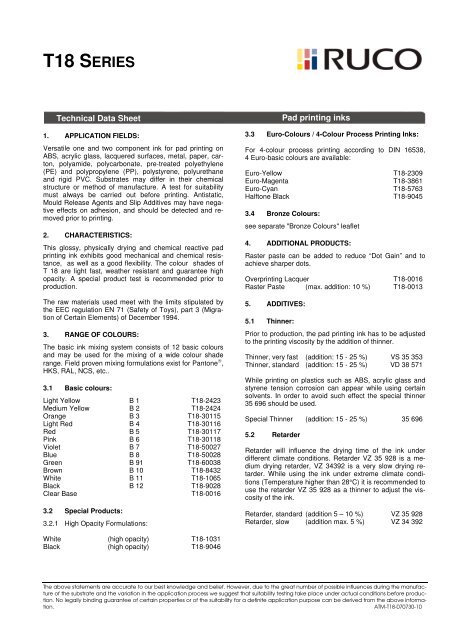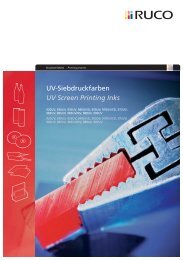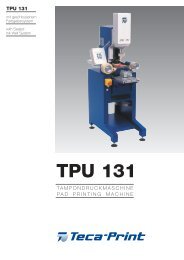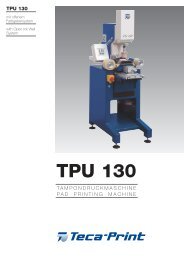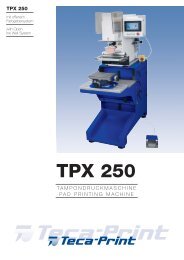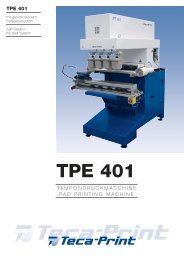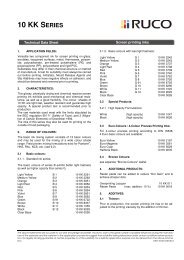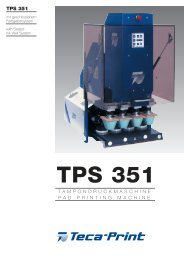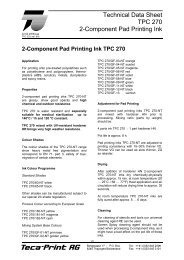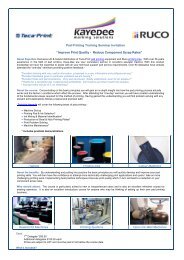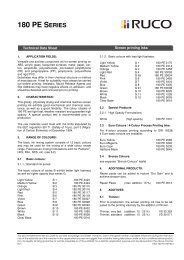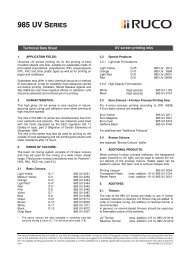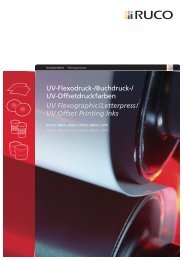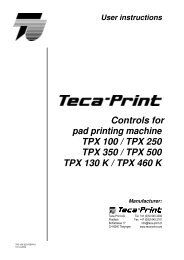T18 SERIES - Kaye Dee Marking Equipment
T18 SERIES - Kaye Dee Marking Equipment
T18 SERIES - Kaye Dee Marking Equipment
You also want an ePaper? Increase the reach of your titles
YUMPU automatically turns print PDFs into web optimized ePapers that Google loves.
<strong>T18</strong> <strong>SERIES</strong><br />
Technical Data Sheet<br />
1. APPLICATION FIELDS:<br />
Versatile one and two component ink for pad printing on<br />
ABS, acrylic glass, lacquered surfaces, metal, paper, carton,<br />
polyamide, polycarbonate, pre-treated polyethylene<br />
(PE) and polypropylene (PP), polystyrene, polyurethane<br />
and rigid PVC. Substrates may differ in their chemical<br />
structure or method of manufacture. A test for suitability<br />
must always be carried out before printing. Antistatic,<br />
Mould Release Agents and Slip Additives may have negative<br />
effects on adhesion, and should be detected and removed<br />
prior to printing.<br />
2. CHARACTERISTICS:<br />
This glossy, physically drying and chemical reactive pad<br />
printing ink exhibits good mechanical and chemical resistance,<br />
as well as a good flexibility. The colour shades of<br />
T 18 are light fast, weather resistant and guarantee high<br />
opacity. A special product test is recommended prior to<br />
production.<br />
The raw materials used meet with the limits stipulated by<br />
the EEC regulation EN 71 (Safety of Toys), part 3 (Migration<br />
of Certain Elements) of December 1994.<br />
3. RANGE OF COLOURS:<br />
The basic ink mixing system consists of 12 basic colours<br />
and may be used for the mixing of a wide colour shade<br />
range. Field proven mixing formulations exist for Pantone ,<br />
HKS, RAL, NCS, etc..<br />
3.1 Basic colours:<br />
Light Yellow B 1 <strong>T18</strong>-2423<br />
Medium Yellow B 2 <strong>T18</strong>-2424<br />
Orange B 3 <strong>T18</strong>-30115<br />
Light Red B 4 <strong>T18</strong>-30116<br />
Red B 5 <strong>T18</strong>-30117<br />
Pink B 6 <strong>T18</strong>-30118<br />
Violet B 7 <strong>T18</strong>-50027<br />
Blue B 8 <strong>T18</strong>-50028<br />
Green B 91 <strong>T18</strong>-60038<br />
Brown B 10 <strong>T18</strong>-8432<br />
White B 11 <strong>T18</strong>-1065<br />
Black B 12 <strong>T18</strong>-9028<br />
Clear Base <strong>T18</strong>-0016<br />
3.2 Special Products:<br />
3.2.1 High Opacity Formulations:<br />
3.3 Euro-Colours / 4-Colour Process Printing Inks:<br />
For 4-colour process printing according to DIN 16538,<br />
4 Euro-basic colours are available:<br />
Euro-Yellow <strong>T18</strong>-2309<br />
Euro-Magenta <strong>T18</strong>-3861<br />
Euro-Cyan <strong>T18</strong>-5763<br />
Halftone Black <strong>T18</strong>-9045<br />
3.4 Bronze Colours:<br />
see separate "Bronze Colours" leaflet<br />
4. ADDITIONAL PRODUCTS:<br />
Raster paste can be added to reduce “Dot Gain” and to<br />
achieve sharper dots.<br />
Overprinting Lacquer <strong>T18</strong>-0016<br />
Raster Paste (max. addition: 10 %) <strong>T18</strong>-0013<br />
5. ADDITIVES:<br />
5.1 Thinner:<br />
Prior to production, the pad printing ink has to be adjusted<br />
to the printing viscosity by the addition of thinner.<br />
Thinner, very fast (addition: 15 - 25 %) VS 35 353<br />
Thinner, standard (addition: 15 - 25 %) VD 38 571<br />
While printing on plastics such as ABS, acrylic glass and<br />
styrene tension corrosion can appear while using certain<br />
solvents. In order to avoid such effect the special thinner<br />
35 696 should be used.<br />
Special Thinner (addition: 15 - 25 %) 35 696<br />
5.2 Retarder<br />
Pad printing inks<br />
Retarder will influence the drying time of the ink under<br />
different climate conditions. Retarder VZ 35 928 is a medium<br />
drying retarder, VZ 34392 is a very slow drying retarder.<br />
While using the ink under extreme climate conditions<br />
(Temperature higher than 28°C) it is recommended to<br />
use the retarder VZ 35 928 as a thinner to adjust the viscosity<br />
of the ink.<br />
Retarder, standard (addition 5 – 10 %) VZ 35 928<br />
Retarder, slow (addition max. 5 %) VZ 34 392<br />
White (high opacity) <strong>T18</strong>-1031<br />
Black (high opacity) <strong>T18</strong>-9046<br />
The above statements are accurate to our best knowledge and belief. However, due to the great number of possible influences during the manufacture<br />
of the substrate and the variation in the application process we suggest that suitability testing take place under actual conditions before production.<br />
No legally binding guarantee of certain properties or of the suitability for a definite application purpose can be derived from the above information.<br />
ATM-<strong>T18</strong>-070730-10
<strong>T18</strong> <strong>SERIES</strong><br />
It must be noted that an excessive addition of retarder may<br />
negatively influence the ink transfer and the bulk goods<br />
resistance, due to the slow evaporation of the retarder.<br />
Retarder VZ 34 392 should only be used in conjunction<br />
with thinner VD 38 571 or retarder VZ 35 928.<br />
Special Retarder, very slow<br />
(addition max. 10%) 100 VR 1170<br />
5.3 Adhesion Modifier:<br />
In order to achieve an adhesion onto not pre-treated Polypropylene<br />
(PP) the addition of adhesion modifier HV 100<br />
VR 1260 is recommended. Please note that the addition of<br />
the adhesion modifier will accelerate the drying of the ink.<br />
Adhesion modifier<br />
(addition 10 – 20 %) HV 100 VR 1260<br />
5.4 Hardener:<br />
Hardener 37172 is the standard hardener. At room temperature<br />
of 20° C a pot life of approximately 12 hours can<br />
be achieved.<br />
Hardener FL 1484 is recommended in order to achieve a<br />
higher weather resistance as well as for the use of closed<br />
systems. The reactivity of the hardener is lower in comparison<br />
with the hardener 37172, so the pot life will 12 – 14<br />
hours. The final hardening of the film will be finished after 2<br />
days.<br />
Hardener, standard (addition 10 %) 37172<br />
Hardener (addition 10 %) Fl 1484<br />
Please note that the final chemical and physical resistance<br />
of the ink is only achieved after 36 hours at room temperature<br />
of 20° C.<br />
During processing and drying of the printed ink, the temperature<br />
should not be lower than 15° C otherwise the<br />
chemical crosslinking is stopped. Also avoid high humidity<br />
for several hours after printing as the hardener is sensitive<br />
to humidity. While using hardener please note that multicolour<br />
jobs have to be printed during 36 hours. The completely<br />
dried ink can not be overprinted.<br />
5.5 Levelling Agent:<br />
The levelling of the ink surface can be optimised by the<br />
use of a levelling agent. It must be noted that excessive<br />
addition of levelling agent can have a negative influence on<br />
the overprintability.<br />
Levelling Agent (max. add.: 0,5-1 %) VM 100 VR 133<br />
6. PROCESSING INSTRUCTIONS:<br />
6.1 Pre-treatment:<br />
Pre-treatment of polyolefines (PE/PP) must be performed<br />
by Flame Treatment or CORONA-discharge in order to<br />
insure the adhesion of the pad printing ink to the substrate.<br />
In case of PE, surface tension needs to be at least 42<br />
mN/m (Dynes/cm), in case of PP at least 52 mN/m<br />
(Dynes/cm).<br />
6.2 Cliché/Printing <strong>Equipment</strong>/Pad:<br />
The T 18 series can be used with all pad printing machines<br />
with clichés and pads currently used for industrial applications.<br />
However, it has to be noted that type (screen) and<br />
etching depth of the cliché, mould and hardness of the<br />
pad, the adjustment of the ink (addition of thinner and/or<br />
retarder) as well as printing speed may influence the printing<br />
result.<br />
6.3 Curing Conditions:<br />
At room temperatures (21° C) the inks of T 18 series are<br />
grip dry within 5 minutes. While adding hardener to the ink,<br />
drying of the ink will take approximately 36 hours at room<br />
temperature. To accelerate the ink drying onto the substrate<br />
the use of hot air blower or infrared lamps is recommended.<br />
It must be noted that after heat treatment a cooling<br />
section must be installed in order to avoid that the<br />
printed parts stick together.<br />
7. CLEANING:<br />
Clichés and other working materials can be cleaned with<br />
the RUCO Universal cleaner 32 335. It must be noted that<br />
the pad does not come into contact with solvents. For the<br />
cleaning of the pad please see to the application references<br />
of the pad manufacturers. If cleaning is not performed<br />
by fully automatic cleaning equipment, protective<br />
gloves must be worn.<br />
Universal Cleaner UR 32 335<br />
Cleaner for cleaning equipment WR 100 VR 1240C<br />
Bio degradable Cleaner BR 100 VR 1272<br />
The above statements are accurate to our best knowledge and belief. However, due to the great number of possible influences during the manufacture<br />
of the substrate and the variation in the application process we suggest that suitability testing take place under actual conditions before production.<br />
No legally binding guarantee of certain properties or of the suitability for a definite application purpose can be derived from the above information.<br />
ATM-<strong>T18</strong>-070730-10
<strong>T18</strong> <strong>SERIES</strong><br />
8. SHELF LIFE:<br />
A shelf life of 12 months is guaranteed when storing the<br />
inks at 21°C and in the original packing container. At<br />
higher storage temperatures the shelf life will be reduced.<br />
9. PRECAUTIONS:<br />
For further information on the safety, storage and environmental<br />
aspects concerning these products, please refer to<br />
the Material Safety Data Sheet (MSDS).<br />
Additional technical information may be obtained from our<br />
staff of the Technical Application Department.<br />
A.M. RAMP & Co. GmbH<br />
Lorsbacher Strasse 28<br />
D-65817 Eppstein<br />
Tel: ++49 (0) 6198-304-0 FAX: ++49 (0) 6198-304-287<br />
E-Mail: info@ruco-inks.com<br />
The above statements are accurate to our best knowledge and belief. However, due to the great number of possible influences during the manufacture<br />
of the substrate and the variation in the application process we suggest that suitability testing take place under actual conditions before production.<br />
No legally binding guarantee of certain properties or of the suitability for a definite application purpose can be derived from the above information.<br />
ATM-<strong>T18</strong>-070730-10


